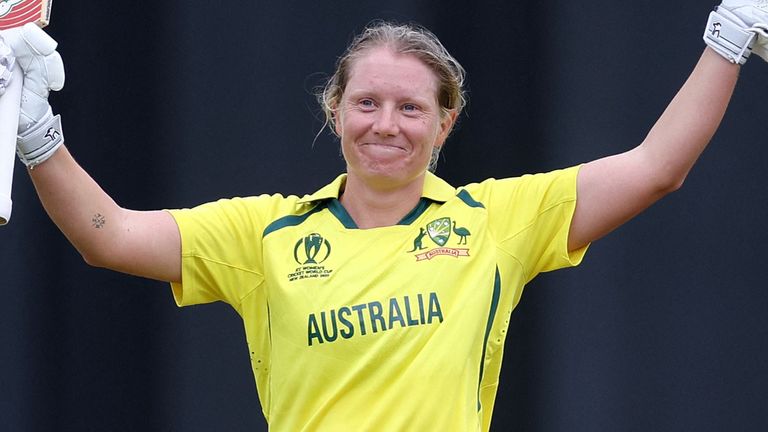Battered, bruised and without a world title in any format in their trophy cabinet, Meg Lanning’s team drew a line in the sand. They knew they were good, but not good enough. “It was at that moment it slapped us in the face,” says Lanning.”We had to do something different otherwise we’d win most games, but not the really important ones.”It was the catalyst for how we have changed the way we approach our cricket, on and off the field.”Lanning was speaking on a grey Monday in Christchurch, the day after she got her hands on the 50-over World Cup. It completed the set for Australia – they are now holders of both women’s World Cups and the Ashes. Their record-breaking final victory over England was an awesome display of power, the crowning glory of perhaps the best sports team on the planet. For England, there is no shame in losing to such a dominant force. To ask why they were unable to stop the Aussies is like wondering if anyone could have beaten Arsenal’s Invincibles, run faster than Usain Bolt or produce a routine better than Nadia Comaneci’s perfect 10 on the uneven bars. Sometimes, the opposition are just too good. On the face of it, England have had a winter that has roughly met expectations. They lost an Ashes series they were not fancied to win, while most would have predicted a runners-up spot at the World Cup before the tournament began. But the devil is in the detail. They went winless in the Ashes, and the wheels came off after the exertions of a Test that they could, and probably should, have won but nearly lost. The aftermath was six straight one-day international defeats, including three at the World Cup that nearly resulted in a humiliating group-stage exit which would have probably resulted in jobs coming under threat. England return home this week after the longest tour they have ever undertaken, more than 100 days in Covid-induced ‘safe living’. Players have four weeks off before the home summer, which includes a Commonwealth Games Twenty20 tournament that is the next opportunity to test themselves against Australia. The unfortunate truth for England – and the rest of the world – is Australia are unlikely to get dramatically worse. If the gap is going to be closed, England must get much better. That improvement will not just have to be in runs, wickets and catches, but in things like athleticism, match awareness and decision-making. A stronger domestic set-up in England will help to more closely replicate the demands of international cricket, therefore ensuring players are better prepared when they step up. However, the new structure, including more players on professional contracts, is only two years old and has so far been lived out entirely during the pandemic. It will take time – maybe another four or five years – for the England team to fully see the benefits.In the short term, it feels likely that the England squad will see a reasonable amount of upheaval in the coming months and years.No team at the World Cup had more players aged 30 or over than England’s seven. Even though the next 50-over tournament is only three years away, 36-year-old pace bowler Katherine Brunt will surely not be there and it seems unlikely her long-time new-ball partner Anya Shrubsole will make it either. Replacements for openers Tammy Beaumont and Danni Wyatt may have to be found, while Lauren Winfield-Hill and Georgia Elwiss, the latter possessing a central contract but not in the World Cup squad, seem set to be moved on. There is a promising core to build on. It is scarcely believable that left-arm spinner Sophie Ecclestone, the World Cup’s leading wicket-taker, is only 22. She could have the career of an all-time great, perhaps in tandem with off-spinner Charlie Dean, who is only 21. Beneath them, fellow spinners Mady Villiers and Sarah Glenn are in their early 20s.At 23, Sophia Dunkley should become a bedrock of England’s batting, hopefully joined by Alice Capsey and Maia Bouchier. Lauren Bell and Issy Wong are exciting fast-bowling prospects. Will the prospect of shaping a new team entice Heather Knight, 31, to remain as captain? After the final defeat, Knight doubled down on her decision to field first, despite seeing her team chase leather as Australia racked up 356-5.It was undoubtedly a mistake, but Knight does not make many. Her level-headed leadership was a big factor in England turning their three opening defeats into a five-match winning run to the World Cup final.The captaincy should be hers if she wants to keep it, with support continuing to come from all-rounder Nat Sciver, who, at 29, will still be at her peak at the 2025 World Cup. Women’s cricket is about to embark on a new, relentless schedule. There are global events in each of the next nine years. Domestically, The Hundred in England and Big Bash in Australia are about to be joined by leagues in the Caribbean and Pakistan, and possibly an Indian Premier League. On top of that, England have the regular Ashes cycle and a growing number of Tests against teams such as India and South Africa.The challenge will be to nurture enough players in domestic cricket to drive the national team forward. In Australia there about 120 women playing professional cricket for at least part of the year, compared to a maximum of 70 in England. That depth allowed Australia to absorb injuries to Sophie Molineux, Georgia Wareham and Tayla Vlaeminck without missing a beat at the World Cup. If England had suffered similar losses, then the group-stage exit would probably not have been averted. A greater number of high-quality players in domestic cricket also helps those in the England team guard against complacency, providing a drive to improve that might not have been there when the number of elite female cricketers in the country totaled no more than 20.The building blocks are there for England – a group of talented young players, a strong captain who hopefully still has more to give and a domestic set-up that should grow in both size and quality. Now, they just have to use the memory of Australia celebrating with the World Cup in the Christchurch night as their motivation to not let it happen again.
COURTESY

























